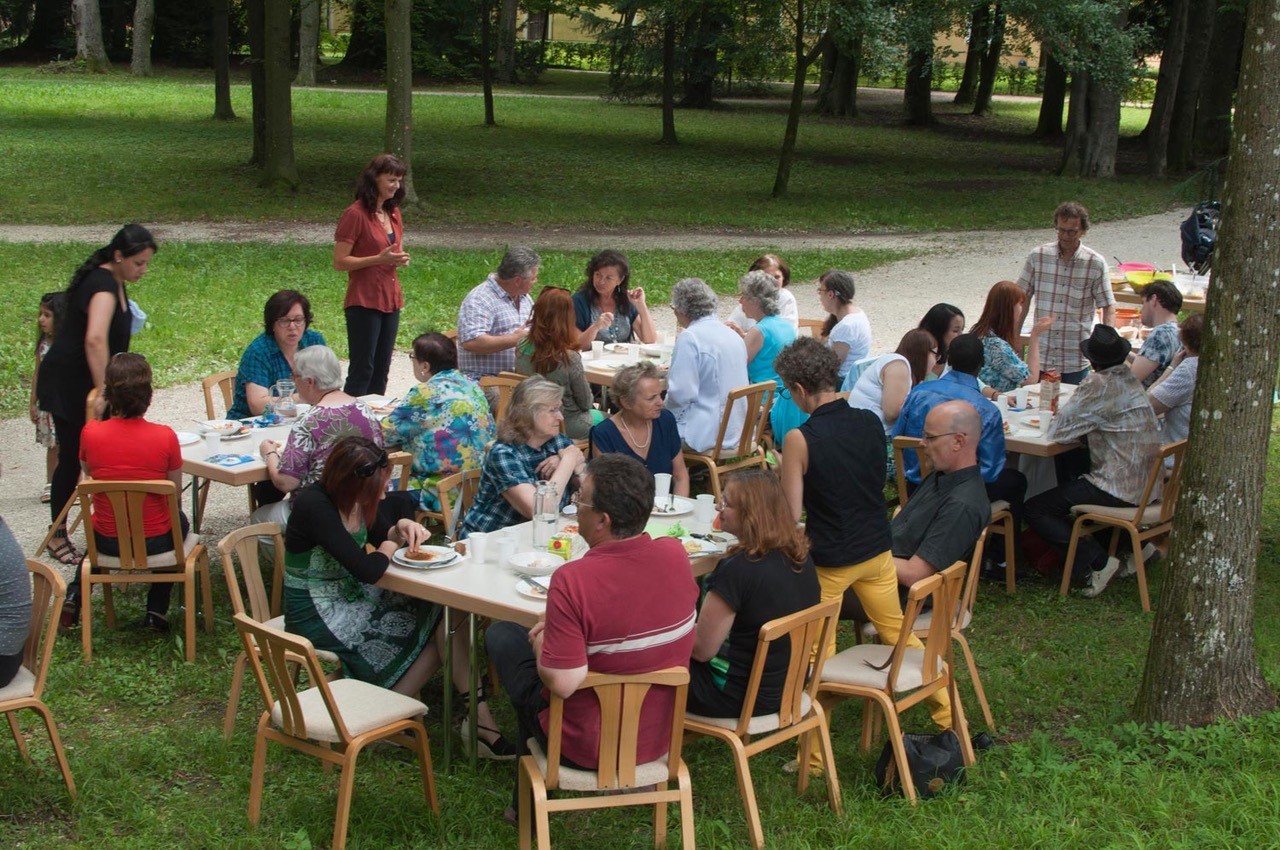Austria
Mennonitischen Freikirche Österreich (MFÖ) / Mennonite Free Church of Austria
The Mennonite Free Church in Vienna is the community in which I had the privilege of growing up. We are a small but incredibly family-oriented church, centred around Jesus Christ, the Son of God.
I can identify myself very well with the Mennonites because they see themselves as commissioned by God to bring about peace and to meet one another – and one’s neighbor – in love.
In practical terms, this means that as a “living community,” we are constantly faced with challenges and a variety of difficulties. Nevertheless, there is the willingness and love to grow together with these obstacles and to want to overcome them in unanimity. However, unanimity does not mean that we always have one and the same opinion, but that we want to submit to the decision made together in the community meeting in peace.
When I was baptized in faith in September 2011, I personally made the decision to serve in this church and therefore officially asked for membership. Since taking this step, I can say that it is incredibly blessing and enriching to follow Christ in the midst of God’s great family.
I have been encouraged so often by other members to serve God with my personal gifts (in praise and in children’s services). I have learned a lot, experienced ups and downs and have been carried through difficulties. My character was formed; I can gratefully state that I have a patient Lord who is patient with me, even when I face the same problem for the third time.
– Franziska, a member of MFWien, a Mennonite congregation in Vienna, Austria
Mennonitischen Freikirche Österreich (MFÖ) / Mennonite Free Church of Austria
Since the beginning of organized Mennonites in Austria, participation in Mennonite World Conference has been shared with German Mennonite Brethren national churches: Arbeitsgemeinschaft Mennonitischer Brüdergemeinden in Deutschland (AMBD) and the Vereinigung der Menoniten Brudergemein von Bavaria (VMBB). After the AMBD was accepted as a member of the MWC, the MFÖ has been represented by its own delegate.
The MFÖ currently consists of 6 parishes with 385 members. After the number of members had slowly decreased for almost two decades because two congregations were closed and four church planting works were unsuccessful, an increase in members was recorded in 2019. Unfortunately, the “corona year” 2020 stopped this tentative growth of the MFÖ.
History
Anabaptism, starting in Switzerland, spread very quickly in the Habsburg hereditary lands. It is estimated that about one third of the population, next to the Catholics and Lutherans, were Anabaptists. However, the Habsburg monarchs saw themselves as defenders of the Roman Catholic church and thus fought the Reformation. Many Lutherans and Anabaptists were expelled from Austria. While “secret Protestants” may have existed in remote mountain areas, the Anabaptists disappeared.
Only after the Second World War did Mennonites come to Austria again to help the Mennonite refugees from Eastern Europe. Communities have emerged through the refugee work in Upper Austria and Vienna. Missionaries from the Mennonite Brethren were active in Upper Austria. A community was founded in Vienna, in cooperation between MCC and Sonnenberggemeinde in Switzerland.
The Mennonite congregations, like other Free Church congregations, were not recognized as churches in Austria. This has resulted in a variety of disadvantages. In order to remedy this unequal treatment towards the recognized churches, the Roman Catholic church, the Lutheran and Reformed churches, the Institute for Legal Philosophy of the University of Vienna and the ecumenical movement “Paths of Reconciliation – the round table” have endeavoured, in cooperation with the Free Churches, to obtain state recognition of the Free Churches (FKÖ). This was achieved in 2013 through the merger of the Free Church conferences of Baptists, Evangelicals, Pentecostal and charismatic movements, the Elaia Christian community and the MFÖ.
In 2019, the Bruderhof movement was accepted into the MFÖ as the Bruderhof parish Austria.
The people in our communities consist mainly of Austrians and members of various European and non-European countries. Because of the international refugee movements, people from the Middle East find a home in our communities. Therefore, the composition of the churches is very international, more in the larger cities, as expected.
Many of our members come from Catholicism, some from the evangelical church. Due to the short history of the Free Churches in Austria, there are only a few Christians of the second generation and hardly any third generation.
Currently, the congregations have sent missionaries to Bangladesh and Kyrgyzstan and support them financially and with prayer.
Challenges
The Mennonite churches are small. The largest community is in Wels with around 100 members. Three churches have employed pastors on a part-time basis. Two churches are led by people who provide spiritual and practical leadership for their communities in addition to their full-time employment. In the foreseeable future, many leaders who have been tried and tested over many years will have to be replaced by younger colleagues – who in turn are busy with their professional and family tasks.
In the communities there are also young families and co-workers whose heartfelt concern is to plant churches. In these matters too, the pandemic was and is a significant obstruction.
Our people have brought different theological ideas from their personal stories and religious backgrounds. There is clear influence of the Brethren Movement through literature and influences of North American evangelicalism. What is typically “Mennonite” is less understood; as a more or less interesting history. Our pastors do not come from a Mennonite tradition, but from other traditions and therefore they do not have an eye for what is special in being Anabaptist. It remains to be hoped and expected that by participating in international Mennonite events our pastors and co-workers will discover these particularities.
Opportunities

The Austrian population is very traditional and likes to orientate itself towards decisions made by authorities. This could be an aftermath of the long monarchical rule in Austria.
As a result of the state accreditation, the Free Churches surprisingly have a significantly better acceptance among the population and, above all, with the authorities. Even if the diversity of the Free Churches still represents a considerable problem of understanding, explanations from the accredited Free Churches are increasingly being requested. The FKÖ therefore has the opportunity to join boards that discuss topics of high relevance to society and also the chance to help to shape those boards, both in ecclesiastical and political directions. Dialogue with other churches and religious societies is also more possible now.
Through the Mennonites’ 500-year history of Anabaptism, Austrian society realizes the European roots of the Free Churches, as well as permanence, consistency and also reliability – good signs of an old tradition.
Years ago, controversy and sometimes enmity between the Anabaptist-minded traditions and other Free Churches was possible, now the collaboration has led to much more respectful togetherness.
Within the FKÖ, Mennonites were allowed to serve with a balancing position between widely differing attitudes, such as charismatics and evangelicals can have. It seems that Mennonite peace-loving serenity is valued.
The five Conferences within the Free Church of Austria (FKÖ) have the chance to prove themselves in everyday interaction and thereby show that it is possible to be unified without having to give up one’s own identity. With the belief of the Evangelical Alliance, the FKÖ has given itself a theological framework and works with one voice on legal and social issues. Yet the conferences and their churches remain autonomous. In this way, Austrian society can be shown at once the diversity and unity of the five different traditions through our public appearance.
These or similar principles could also be exemplary beyond the borders of Austria.
|
|
Reinhard Kummer is the presiding officer of Mennonitischen Freikirche Österreich (MFÖ) / Mennonite Free Church of Austria |

